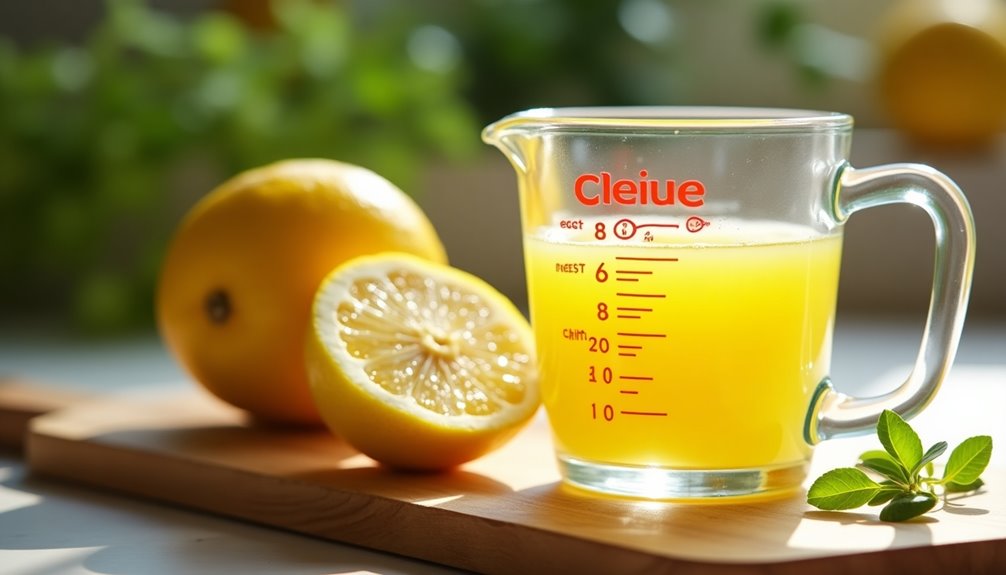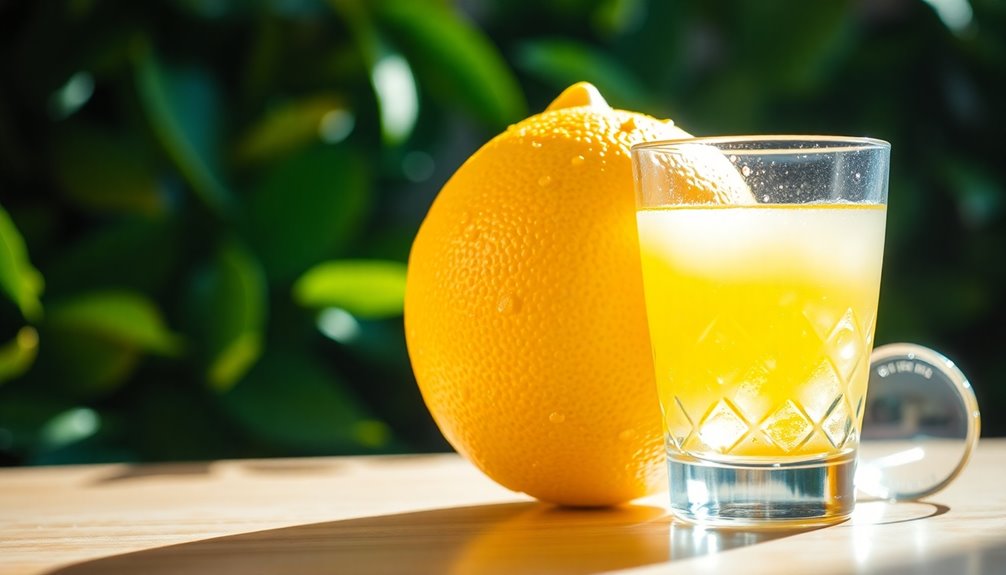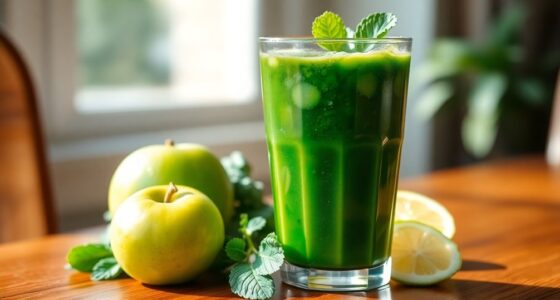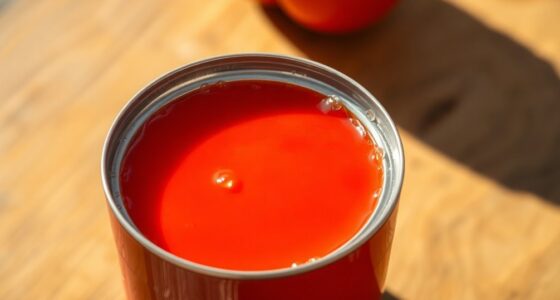A medium lemon usually yields about 3 tablespoons of juice, while a large lemon gives you around 4 tablespoons. So, if you need a specific amount of lemon juice for a recipe, you can plan accordingly. For example, ½ cup of lemon juice requires 2 large lemons or 3 medium ones. It's helpful to have a few extra lemons on hand for emergencies. Want to know more tips on maximizing your lemon juice extraction?
Key Takeaways
- A medium lemon yields about 3 tablespoons of juice.
- A large lemon provides approximately 4 tablespoons (¼ cup) of juice.
- To get ½ cup of juice, use 2 large or 3 medium lemons.
- For a full cup, you'll need 4 large lemons or 6 medium lemons.
- Juice yield can vary based on the size and ripeness of the lemon.

Have you ever wondered how much lemon juice you can get from a fresh lemon? If you're planning to whip up a delicious dish or drink, knowing the amount of juice in a lemon can help you get it just right. Lemons are versatile citrus fruits that can elevate flavors in both sweet and savory recipes. Understanding how much juice you can squeeze from different sizes of lemons can save you time and ensure your recipe turns out perfectly.
Typically, a medium lemon yields about 3 tablespoons of juice. If you need more than that, you might want to grab a large lemon, which can provide around 4 tablespoons, or a quarter cup of juice. This is particularly useful if you're making a recipe that calls for a specific amount of lemon juice. For instance, if you're following a recipe that requires ½ cup of lemon juice, you'll need about 2 large lemons or 3 medium lemons. Knowing this can prevent any last-minute dashes to the store when you realize you don't have enough lemon juice on hand.
Sometimes, you might find yourself needing a whole cup of lemon juice. In that case, be prepared to use about 4 large lemons or 6 medium lemons. It's always best to have a few extra lemons in your kitchen just in case. The juice yield can vary depending on the size and ripeness of the lemon, so having an extra lemon or two can be a lifesaver when you're in the middle of cooking or baking.
If you're ever in a pinch and only have half a lemon, you can still get some juice out of it. Half a medium lemon produces about 1½ tablespoons of juice, while half a large lemon yields around 2 tablespoons. This can be handy for those small recipes that only require a splash of lemon juice for flavor. Knowing how much juice you can get from a single lemon can help you adjust your recipes accordingly.
When you're experimenting with different flavors in the kitchen, you'll quickly realize that the amount of juice extracted can change depending on how you prepare the lemon. Rolling the lemon on the counter before cutting it can help release more juice, so don't forget to try that trick.
Whether you're making a refreshing lemonade, a zesty salad dressing, or a tangy marinade, understanding how much lemon juice you can extract from your lemons will keep your culinary adventures flowing smoothly. So, the next time you need lemon juice, you'll know exactly how many lemons to grab, ensuring you're always prepared for whatever delicious creation you have in mind.
Frequently Asked Questions
How Much of Bottled Lemon Juice Is Equal to One Lemon?
When you’re looking to substitute bottled lemon juice for fresh lemons, you can use about 3 tablespoons of bottled juice for one medium lemon. Keep in mind that bottled lemon juice may have a different flavor profile than fresh lemons, so it’s a good idea to taste your dish as you go. For more precise conversions, refer to a lemon juice concentrate measurement guide, which can help you achieve the right balance in your recipes. Remember to adjust the acidity and sweetness in your dish, as fresh lemons often add a unique brightness that bottled juice may not replicate perfectly.
It's important to taste as you go since some brands might be more concentrated or contain preservatives that change the flavor.
If you need less, 2 tablespoons can replace the juice from half a lemon.
Adjust according to your recipe and personal preference for the best results!
Can You Substitute Bottled Lemon Juice for Fresh Lemon Juice?
Did you know that one medium lemon yields about 3 tablespoons of juice?
You can substitute bottled lemon juice for fresh lemon juice, but it's not always a perfect match. Bottled juice often lacks the vibrant flavor and aroma of fresh juice and contains preservatives.
When you do substitute, start with a smaller amount and adjust to taste, as the acidity levels can vary significantly between the two.
How Much Lemon Juice Is in 1 Lemon?
When you're squeezing a lemon, you can expect to get about 3 tablespoons of juice from a medium lemon and up to 4 tablespoons from a large one.
So, if you're planning a recipe, keep in mind that you'll need around 6 medium lemons or 4 large ones to get a full cup of juice.
It's always smart to have a few extra lemons handy, just in case.
Is Drinking Lemon Juice the Same as Lemon Water?
Drinking lemon juice isn't the same as drinking lemon water.
When you sip lemon juice, you're consuming a concentrated source of acidity and flavor, while lemon water is a milder mix of lemon juice and water.
If you're looking for hydration without the strong acidity, lemon water's gentler on your stomach.
However, if you want the full nutrient punch, stick with straight lemon juice.
Both can benefit your health, but in different ways.
Conclusion
So, the next time you're in need of lemon juice, remember that one medium lemon typically yields about 2 to 3 tablespoons of juice. Isn't it amazing how simple conversions can make cooking so much easier? Whether you're whipping up a refreshing drink or adding zest to a dish, knowing this little fact can save you time and effort. So go ahead, squeeze away and enjoy the bright, tangy flavor that lemons bring to your culinary creations!
Cindy thoroughly researches juicing trends, techniques, and recipes to provide readers with practical advice and inspiration. Her writing style is accessible, engaging, and designed to make complex concepts easy to understand. Cindy’s dedication to promoting the advantages of juicing shines through her work, empowering readers to make positive changes in their lives through the simple act of juicing.
















